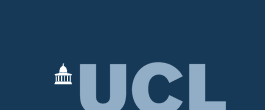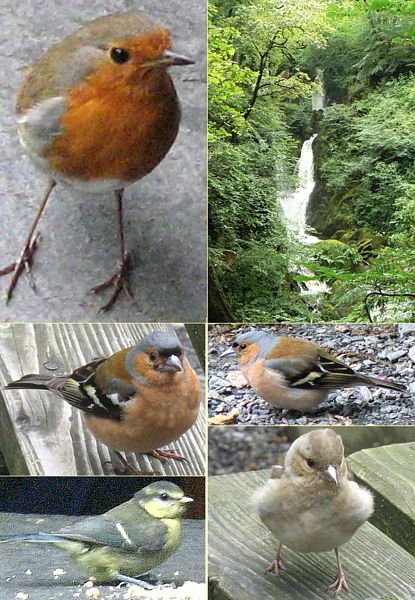|
|
|
mr
Publications | Older papers | DC bio | ACh movie | DC's Improbable science blog | Photo pages | Politics | Education & Religion | RSS feeds | Single Ion Channels: Receptor and Synaptic MechanismsProfessor David Colquhoun, FRSThis page is now officially superseded by my more corporate home page
Recent publications | Older papers: full text 1969-1997 | ACh movie | Latest science |
ResearchTransmission of an impulse from one nerve cell to another, or to a muscle cell, occurs by the release of a chemical substance, such as acetylcholine or glutamate, which combines with specific protein molecules- receptors- in the membrane of the downstream cell. These receptors form molecular pores which span the cell membrane, and the combination of the transmitter with them causes the pore to open, which allows the passage of sodium and other ions. The current caused by movement of these ions across the membrane then initiates an electrical impulse. We are studying the receptors for glutamate, acetylcholine and glycine by a combination of biophysical and molecular biological approaches. We record the currents through individual receptor-channels which are in their natural environment, the membranes of nerve cells from the brain or ganglia. We also record from channels that have been made from cloned DNA and artificially inserted into a convenient cell membrane. The latter method has the advantage that (with luck) you know which molecule you are dealing with, and also that altered receptors can be made by mutating the amino acid sequence of the receptor proteins. These methods allow us to address a variety of questions. A major question that concerns us is the exact molecular nature of the receptors that occur in living cells in various parts of the nervous system. At a more basic level we are interested in the nature of the molecular interactions that cause the channels to open and shut, and what it is that controls the speed of synaptic events. Once one knows the rates of individual steps in the ion channel reaction mechanism, the binding-gating problem is solved, the way is cleared for rational interpretation of the effects of mutations in the receptor protein, and the response to any arbitrary time course of synaptic concentration of transmitter can be calculated. We have taken this approach to analysis of natural disease-causing mutations in human muscle nicotinic acetylcholine receptors, and in human glycine receptors (the latter being in collaboration with Sivilotti's lab). Analysis and theoryWe have also been closely involved in developing new methods for the analysis of single channel recordings which, because they originate from single molecules, are random in nature. And, in collaboration with Professor A.G. Hawkes (who does all the difficult stuff), we have developed much of the underlying stochastic theory which is necessary for the interpretation of these recordings. This theory allows us to interpret single channel recordings in which short events are undetected, and most recently has been extended to deal with non-stationary channels, such as those observed after a brief pulse of agonist is applied. This theory has proved essential for the interpretation of our experimental observations. For example, we have been interested in questions such as 'what does an individual activation of an ion channel look like, and how is it related to synaptic currents?', 'how can we understand the effect of mutating an amino acid in the receptor?', and 'how can we tell whether a particular amino acid forms part of the binding site?'. One outcome of the theory has been the development of an optimum method (the HJCFIT program) for estimation of rate constants in a mechanism, with exact correction for missed events). We run a graduate school course each June or July, in which the necessary mathematical background for the understanding of these methods is taught. Photographs for the 2003 and 2004 schools here. |
|||||||||||||||||||||
|
||||
|
. . . in Iraq, the British have been “led into a trap from which it will be hard to escape with dignity and honour. They have been tricked into it by a steady witholding of information. . . . We are today not far from a disaster”, Lawrence of Arabia, on occupation of Iraq in 1920 [read more]. “Amid all the natural and political disasters it faces, the White House is certainly tireless in its effort to legalize torture” New York Times. [read more]. Free speech Thanks to the liberal traditions of UCL, I am allowed to say what I like here (unlike most US and some UK universities). [click here for more]. |
|
Timeless Quotations
" . . . the people can always be brought to the bidding of the leaders. That is easy. All you have to do is tell them they are being attacked, and denounce the pacifists for lack of patriotism, and exposing the country to greater danger." Herman Goering (at the Nuremberg trials). "All that is necessary for the triumph of evil is that good men do nothing." Attributed to Edmund Burke (1729-1797) "They that can give up essential liberty to obtain a little temporary safety deserve neither liberty nor safety." Benjamin Franklin, Historical Review of Pennsylvania, 1759 "I wish to propose for the reader's favourable consideration a doctrine which may, I fear, appear wildly paradoxical and subversive. The doctrine in question is this: that it is undesirable to believe a proposition when there is no ground whatever for supposing it true. I must, of course, admit that if such an opinion became common it would completely transform our social life and our political system: since both are at present faultless, this must weigh against it. I am also aware (what is more serious) that it would tend to diminish the incomes of clairvoyants, bookmakers, bishops and others who live on the irrational hopes of those who have done nothing to deserve good fortune here or hereafter. In spite of these grave arguments, I maintain that a case can be made out for my paradox, and I shall try to set it forth." Reporter: "What do you think of Western Civilisation?" Gandhi: "It would be a good idea". Gandhi: "Almost everything you do will be insignificant, but it is important that you do it." |
Some recent publications from the group, and more pdf files here.
New RSS feeds. Feeds are now available for four topics. If you know how to use them, get them here,
Otherwise, click here for hints. NOTE The RSS feed for DC's IMPROBABLE SCIENCE
has changed address (lawyers!) to
![]() DC
science RSS feed.
DC
science RSS feed.
 DC's
Improbable Science RSS feed.
DC's
Improbable Science RSS feed.
![]() DC
politics RSS feed.
DC
politics RSS feed.
 DC
religion RSS feed.
DC
religion RSS feed.
http://dcscience.net/improb.xml
visitors from
96 countries since 9-Jan-04.
On 26 January 2006 this page reached 10000 visitors,
and 17888 page loads (since Jan 2004).
On 22 November 2006, the IMPROBABLE SCIENCE overtook this home page, with
25788 page loads.
January 2008 2834 unique visitors, 43873 hits.
This page last modified 8 March, 2012 by David Colquhoun
Summer
School 2011.
2008 picture
Click HERE for DC Analysis Programs HJCFIT April 2007
Click HERE for DCprogs, Windows versions
Lunch hour lecture. 16 October, 2007
See
it here
Partial agonism
The flip model
The spasmodic mutation in the glycine receptor
The profession of psycho-surgery (DOH)
Homeopathic hospital in trouble?
Supplements kill, garlic useless
GSK, Seroxat and Brown University
Bush: God told me to invade Iraq
What not to buy Boycott neocons
DC's Election blog 2005 (history)
Committee for UCL
History of the
2002 attempt to
merge UCL and IC
![]()




